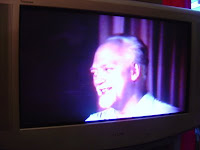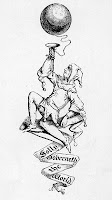As we come to the end of five years of study at MLA I have started considering the words I use to describe the group. If I call MLA a group of online like-minded people, who read the same sort of books and have the same sort of odd interests or ‘take’ on the world as myself – friends look at me funny, as if I have somehow excluded them. I haven’t. They just haven’t shown interest in this stuff, and internet allows me to hang out with a few dozen people I couldn’t find in my home town, who speak the same language.

Secret, occult
As it happens, most of what we discuss doesn’t feel terribly ‘secret’ (concealed, disguised), although we find the conspiracy model intriguing, and secret societies (or, as we’ve all actually heard of Masons and the CIA and MI6 - maybe “societies with secrets”)...and some of it definitely lurches out of ‘straight’ psychology, philosophy and anthropology into deeper realms of magick, shamanism, heretical religion and areas many people might consider ‘occult’ or ‘esoteric’ studies.

Esoteric
But anything can appear ‘esoteric’ – maths remains a mystery to many, just as does punctuation or poetry, say. It simply means something understood only by ‘the initiated’ – but that can simply mean ‘people who know how to cook’ or ‘people who can fix a computer’ for instance – we don’t have to wander into magical realms, here. Who said "the problem with mysticism is that it starts in mist, and ends in schism”? So, yes, I guess we have ‘esoteric interests’ like Bucky Fuller, or Wilhelm Reich, James Joyce and Robert Anton Wilson.

Exoteric
And plenty of people cheerfully prefer exoteric versions of events (the world of appearances, ‘common sense’, plain speaking, simple explanations, etc).
“The Christian exotericists, derived largely from uncultured slave populations, inaugurated a religious revolution against the Christian esotericists, the cultured and well-born followers of the Gnosis”. W.Y. Evans –Wentz; The Tibetan Book of the Great Liberation. 1954

The 'Unexplained'
And then again, we seem to share a certain ‘Fortean’ interest in the odd and the unusual, in explanations like 'synchronicity' and what it might imply about how the world works, and that veers into Quantum Physics – and alternative explanations of possible universes or realms or states of mind, and where they sit on a spectrum from dream to imagination to reality.
Hidden
 I don’t know how much really remains hidden, and how much simply appears obscure because you find yourself wearing shades in a dark nightclub – so the symbol of coolness (and blindness) actually renders one blind. Hoodwinked by oneself, and one's desire to appear cool.
I don’t know how much really remains hidden, and how much simply appears obscure because you find yourself wearing shades in a dark nightclub – so the symbol of coolness (and blindness) actually renders one blind. Hoodwinked by oneself, and one's desire to appear cool.
And ‘occult’ didn’t originally have all those connotations in its original use, it simply meant hidden, concealed or hard to detect. The moon occults the sun during an eclipse.
Supernatural
These shifts in meaning and emphasis still intrigue me. Back in the Nineteenth Century, when Darwin threw down the gauntlet to the 'Western World', and Freethinkers discussed worlds without God, many people yearned for ‘something more’ and the first New Age season occurred.

'Nature' did not suffice, so they sought the ‘supernatural’ in psychic phenomena, spiritualism and other ‘mysteries’. If we use ‘Nature’ to describe the whole universe, then nothing lies outside ‘Nature’, but we sometimes use it to describe ‘the known’.
Paranormal
This did sometimes seem rather superstitious and too much like the old-time religion so with the new pretence to a 'scientific world-view' people in the 1920s adopted the quasi-scientific word ‘paranormal’ to describe events that didn’t fit in with their world view. This smuggled in the assumption that we share a world view that we can all agree upon, whose ‘normality’ sets the standards by which we measure events.
True Believers and cultural relativity

As communication and travel speeded up, and the world shrank, the idea that any one person, culture, philosophy, religion, science or tribe had The True World View became virtually untenable, indeed rather ludicrous to Martian Anthropologists, but a lot of humans still have vested interests in their local POV.
We had another season of yearning for a New Age at the end of the Twentieth Century, that persists even now.
Nothing new under the sun
'They say miracles are past, and we have our philosophical persons to make modern and familiar things supernatural and causeless. Hence it is that we make trifles of terrors, ensconcing ourselves into seeming knowledge when we should submit ourselves to an unknown fear'.
(All's Well That Ends Well, 2. 3. 1-6) William Shakespeare

Magic and Magick and the Wyrd
And then we have that wonderful old word 'magic' which everyone knows and uses, for events from the trivial (everyday) to the most rare, unusual, secret, mysterious, occult and unknown.

And whether it belongs in stories and myths and other metaphors and analogues for real life, or as a serious (and very esoteric and occult) study remains an open question to me...
But mosbunall people around here know I remain a Fool and a Cosmic Schmuck, mosbunall of the time...
As Above, So Below
And then we have Hermeticism (from thrice-great Hermes, of course).
Frances Yates offers this description, referring to the Renaissance period:
“This philosophy, or outlook, was compounded of Hermeticism as revived by Marsilio Ficino, to which Pico de Mirandola added a Christianized version of Jewish Cabala. These two trends, associated together, form what I call ‘the occult philosophy’.”
So you’ll find those of us into Neoplatonism, Gnosticism and Hermeticism, too.

2 comments:
Good reflections on the topic of your blog! Keep exploring! I've been a reader for about a year, simply to read about others who follow the enigma that represents / represented/ will represent the guy who we once called Robert Anton Wilson.
Dichten - Condensare, or something, great to read your scholastic translations Toby.
Post a Comment